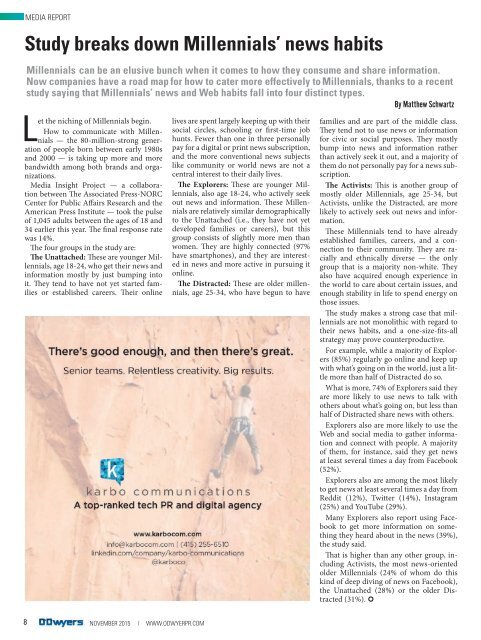Communications & New Media Nov 2015 Vol 29 No 11
odwyers-magazine-november-2015
odwyers-magazine-november-2015
Create successful ePaper yourself
Turn your PDF publications into a flip-book with our unique Google optimized e-Paper software.
MEDIA REPORT<br />
Study breaks down Millennials’ news habits<br />
Millennials can be an elusive bunch when it comes to how they consume and share information.<br />
<strong>No</strong>w companies have a road map for how to cater more effectively to Millennials, thanks to a recent<br />
study saying that Millennials’ news and Web habits fall into four distinct types.<br />
By Matthew Schwartz<br />
Let the niching of Millennials begin.<br />
How to communicate with Millennials<br />
— the 80-million-strong generation<br />
of people born between early 1980s<br />
and 2000 — is taking up more and more<br />
bandwidth among both brands and organizations.<br />
<strong>Media</strong> Insight Project — a collaboration<br />
between The Associated Press-NORC<br />
Center for Public Affairs Research and the<br />
American Press Institute — took the pulse<br />
of 1,045 adults between the ages of 18 and<br />
34 earlier this year. The final response rate<br />
was 14%.<br />
The four groups in the study are:<br />
The Unattached: These are younger Millennials,<br />
age 18-24, who get their news and<br />
information mostly by just bumping into<br />
it. They tend to have not yet started families<br />
or established careers. Their online<br />
lives are spent largely keeping up with their<br />
social circles, schooling or first-time job<br />
hunts. Fewer than one in three personally<br />
pay for a digital or print news subscription,<br />
and the more conventional news subjects<br />
like community or world news are not a<br />
central interest to their daily lives.<br />
The Explorers: These are younger Millennials,<br />
also age 18-24, who actively seek<br />
out news and information. These Millennials<br />
are relatively similar demographically<br />
to the Unattached (i.e., they have not yet<br />
developed families or careers), but this<br />
group consists of slightly more men than<br />
women. They are highly connected (97%<br />
have smartphones), and they are interested<br />
in news and more active in pursuing it<br />
online.<br />
The Distracted: These are older millennials,<br />
age 25-34, who have begun to have<br />
families and are part of the middle class.<br />
They tend not to use news or information<br />
for civic or social purposes. They mostly<br />
bump into news and information rather<br />
than actively seek it out, and a majority of<br />
them do not personally pay for a news subscription.<br />
The Activists: This is another group of<br />
mostly older Millennials, age 25-34, but<br />
Activists, unlike the Distracted, are more<br />
likely to actively seek out news and information.<br />
These Millennials tend to have already<br />
established families, careers, and a connection<br />
to their community. They are racially<br />
and ethnically diverse — the only<br />
group that is a majority non-white. They<br />
also have acquired enough experience in<br />
the world to care about certain issues, and<br />
enough stability in life to spend energy on<br />
those issues.<br />
The study makes a strong case that millennials<br />
are not monolithic with regard to<br />
their news habits, and a one-size-fits-all<br />
strategy may prove counterproductive.<br />
For example, while a majority of Explorers<br />
(85%) regularly go online and keep up<br />
with what’s going on in the world, just a little<br />
more than half of Distracted do so.<br />
What is more, 74% of Explorers said they<br />
are more likely to use news to talk with<br />
others about what’s going on, but less than<br />
half of Distracted share news with others.<br />
Explorers also are more likely to use the<br />
Web and social media to gather information<br />
and connect with people. A majority<br />
of them, for instance, said they get news<br />
at least several times a day from Facebook<br />
(52%).<br />
Explorers also are among the most likely<br />
to get news at least several times a day from<br />
Reddit (12%), Twitter (14%), Instagram<br />
(25%) and YouTube (<strong>29</strong>%).<br />
Many Explorers also report using Facebook<br />
to get more information on something<br />
they heard about in the news (39%),<br />
the study said.<br />
That is higher than any other group, including<br />
Activists, the most news-oriented<br />
older Millennials (24% of whom do this<br />
kind of deep diving of news on Facebook),<br />
the Unattached (28%) or the older Distracted<br />
(31%). <br />
8 NOVEMBER <strong>2015</strong> | www.ODwyERPR.COM


